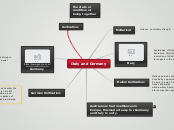Italy and Germany
Militarism:
reliance on military strength

Italy
Austria was still the dominant power on the Peninsula. After the failure of the revolution of 1848, people began to look for support in the North.
The king named Camillo di Cavour his prime minister in 1852. pursued a policy. Cavour, however, knew that his army was not strong enough to defeat the Austrians. So he made an alliance with the French.
Italians gained control of Venetia by supporting Prussia in a war, French troops afterwards withdrew from Rome, and ater on was the capital.
Italian Unification:
Italians gained control of Venetia by supporting Prussia in a war, French troops afterwards withdrew from Rome, and ater on was the capital.
Austria now had no alliances in Europe, this made it easy for Germany and Italy to unify.

Germany
Prussia had become a strong in economy and military power state
So Germany looked for Prussia leadership after they failed the attempt to unify in the Frankfurt Assembly in 1848 and 1849
The Prussian king had firm control over the government and the army. Prussia was also known for its militarism, or reliance on military strength.
German Unification:
The southern German states had agreed to enter the North German Confederation. On January 18, 1871, Bismarck and 600 German princes, nobles, and generals filled the Hall of Mirrors in the palace of Versailles, and William I of Prussia was proclaimed kaiser of the Second German Empire.
